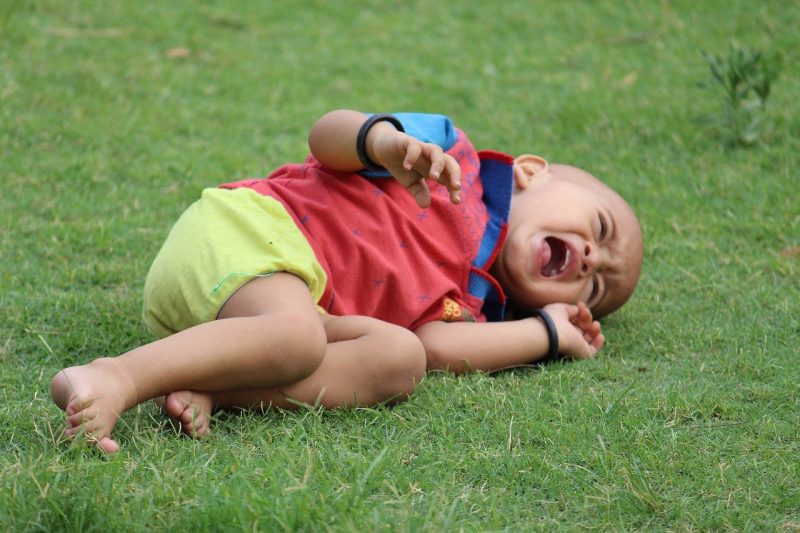Biting is a more common behavior than most parents realize. I used to work in a daycare and was a teacher in the toddler room. We had a few children that would bite other children, which led to many different courses of action.
There were things that we tried with the children to lessen the biting, and there were procedures to follow when a child was bitten.
My children also went to daycare at a young age, and we discovered then that biting was a common problem as well. If you’re concerned about whether your child can be kicked out of daycare for biting, it’s important to look at the entire situation.
Toddler Biting At Daycare
At this age, most children either bite another kid once or twice, or they are the ones that get bitten. If your toddler is the one doing the biting, it’s important to determine why before biting becomes a problem in daycare.
There are several common reasons that children bite at daycare.
Consider When They Bite
We used to have one child, whom we’ll call Brian, that would bite other children daily. He was not teething, could communicate wonderfully, and was generally a wonderful toddler to have in the class.
View in gallery
He was even potty trained early. However, when he was playing in a group of children, he would inevitably bite one of them. It was a matter of minutes before we would hear a wail when he was in a group. This was the only time he would bite children.
Upon observing the group carefully in an effort to jump in before he bit someone, we discovered that no one was being aggressive towards Brian.
The only trigger was being in a larger group of children. It turned out, this gave him anxiety. Biting was a symptom of that. He needed smaller breaks away from large groups. If children are biting due to anxiety, these things can help:
- Taking breaks away from groups of children
- Quiet time in a special place in the room
- Singing
- Rocking
- Frequent breaks and soothing measures to prevent anxiety
Teething
Teething makes children bite everything, including other children. This is a common reason for children biting at daycare.
If your little one is getting their two-year molars in, or they haven’t come in yet, this could be why you have a two or three-year-old biting at daycare.
Teething can also cause irritability in children because they’re in pain. This can make them more aggressive than they would normally be, which can also contribute to biting at daycare.
To help prevent children from biting at daycare due to teething, try some of these options:
- Let them bite a rag or washcloth while at daycare
- Apply baby Orajel before daycare, and send some with them so that they can have a second application at daycare
- Provide the daycare with teething toys they can bite
- A teething toy that they can clip to their shirt
When your little one has something else to bite while at daycare, this lessons the chance that they will bite other children.
[amalinkspro type=”showcase” asin=”B07KWTS2FH” apilink=”https://www.amazon.com/dp/B07KWTS2FH?tag=mominformedcom-20&linkCode=osi&th=1&psc=1″ new-window=”true” addtocart=”false” nofollow=”true” sc-id=”4″ imgs=”LargeImage” link-imgs=”false” specs=”Babys Safety is Our Top Priority – This baby teething toy is made of food-grade silicone. We are committed to focusing on the HEALTHY development and HAPPINESS of your baby.~~~Pain & Gum Soreness Relief – Our infant teething keys are designed to soothe, massage, and reduce fussiness & discomfort. It’s going to relieve your child’s teething pains. Different shapes of products have different textures. The pliable beads and bumps design will help them relieve teething discomfort.~~~Fit For Your Babys Hand – The baby texture toys’ size perfectly shaped for little hands, babies can easily grab onto the stem. Exercise babys fingers flexibility, more easy to hold the teether toy.~~~” btn-color=”#ff9900″ btn-text=”Buy on Amazon” alignment=”aligncenter” hide-prime=”0″ hide-image=”0″ hide-reviews=”0″ hide-price=”0″ hide-button=”0″ width=”750″]Teething Toys (5 Pack) – Tinabless Infant Teething Keys Set[/amalinkspro]
Defending Themselves
Some toddlers view another child taking their toys or pushing them as them being aggressive, and they want to defend themselves. This ultimately results in them biting other children.
If your child is biting to defend themselves, it can be helpful to encourage positive behavior, such as telling the teacher. Daycare teachers can also try to prevent biting before it happens in this situation.
Expression
Toddlers cannot communicate as well as themselves and don’t have the same coping skills that older people do. Instead, they find other ways to release their emotions.
This can involve biting. A toddler may be irritated, annoyed, tired, hungry, or thirsty and bite other children to express that.
Once most children start talking more, they quit biting if this is the cause. Some daycares and parents opt to teach their children sign language at an early age so that they can communicate before they are able to speak. This works wonderfully.
[amalinkspro type=”showcase” asin=”1641520779″ apilink=”https://www.amazon.com/dp/1641520779?tag=mominformedcom-20&linkCode=osi&th=1&psc=1″ new-window=”true” addtocart=”false” nofollow=”true” sc-id=”4″ imgs=”LargeImage” link-imgs=”false” specs=”” btn-color=”#ff9900″ btn-text=”Buy on Amazon” alignment=”aligncenter” hide-prime=”0″ hide-image=”0″ hide-reviews=”0″ hide-price=”0″ hide-button=”0″ width=”750″]Baby Sign Language Made Easy: 101 Signs to Start Communicating with Your Child Now[/amalinkspro]
To Get A Reaction
When children do something and it gets an interesting reaction, they’re more likely to do it again. For example, a teacher might be surprised at the first bite, upset, or the other children might be scared.
This is an interesting reaction to a two-year-old biting at daycare, and it actually makes them more likely to bite again. Instead, do not express emotions when addressing the issue, or make a big deal out of biting.
When adults do this, they can accidentally reinforce the negative behavior.
Attention
A child that hurts another one is obviously going to be the center of attention for a little bit. If a child wants attention, even negative attention can be a good thing for them.
Do not ignore a toddler biting at daycare, but don’t reinforce it with a lot of attention either. Quick removal from the situation with a “no biting” will usually suffice. This can slowly work to eliminate the behavior if it is for attention.
Normal Behavior
Sometimes, biting is a normal part of toddler development. Unfortunately, there are only so many things that can be done about this.
Teething toys and other things can help, but this method is also not foolproof. Continue with reinforcing positive behaviors and teething toys to bite on to help slowly eliminate the problem.
When A Child Biting At Daycare Becomes A Problem
View in gallery
While biting is a normal stage that many children go through, it can still become a problem. Some children get kicked out of daycare for this. It’s often due to other behavior issues or the possible legal issues a daycare can face.
Other times, it might simply be because of the daycare policy. If your child is at risk of being kicked out of daycare, it’s important to know the full situation to determine which way you and your little one are headed.
Can Daycare Kick Child Out For Biting?
Yes, they can. A daycare can recommend that a child no longer attend or flat out refuse to accept them at the daycare center any longer. Often, daycares will give parents a notice so that they have time to find adequate child care.
Severity Of The Bite
In most states, when a daycare has to administer first aid to a child, they’re required to report the incident to both the parent and to the licensing agency.
If bites continue and continue to require first aid, the daycare provider can be in big trouble because it puts the safety of the other children at risk. In this situation, their hands are tied, and they almost have to kick out a child for biting.
Daycare Policy
Because of the rules and regulations mentioned above, many daycares have established policies regarding biting. Some state that a child biting at daycare will be expelled from daycare after so many incidents.
Others might give time for improvement before resorting to this. What the policy often depends on is the daycare itself.
If one of your major concerns is your three-year-old biting at daycare, take the time to learn the daycare policy regarding the behavior.
If your child biting at daycare is becoming a problem, the daycare may discuss this with you anyway. Here is a forum with examples of what daycares have considered, just to give you an idea. It is an older forum, but still a great resource.
Legal Issues
There are times that daycares can get in trouble due to one child biting another. This can be considered a breach of duty because they’re required to give every child reasonable care, and it can be a safety issue when one child bites another one.
Daycares can face liability lawsuits because of this. This is why many daycares have formed stricter policies regarding biting behavior.
My Child Is Biting At A Daycare
If your child is the one biting at daycare, it’s obviously a reason for concern. If a teacher has already had a discussion with you about this behavior, it’s because the behavior is a problem.
View in gallery
There are a few things that you’ll need to be proactive about to make sure that you don’t wind up without childcare.
Familiarize Yourself With The Daycare Policy
If you haven’t already done so, familiarize yourself with the daycare policy. Read the fine print. Determine if there’s a section regarding biting, and make sure to double-check with teachers.
You don’t want to wind up in a jam because your little one got kicked out of daycare for biting and you didn’t know that was going to happen.
Try To Curb Biting
[amalinkspro type=”showcase” asin=”1936903075″ apilink=”https://www.amazon.com/dp/1936903075?tag=mominformedcom-20&linkCode=osi&th=1&psc=1″ new-window=”true” addtocart=”false” nofollow=”true” sc-id=”4″ imgs=”LargeImage” link-imgs=”false” specs=”” btn-color=”#ff9900″ btn-text=”Buy on Amazon” alignment=”aligncenter” hide-prime=”0″ hide-image=”0″ hide-reviews=”0″ hide-price=”0″ hide-button=”0″ width=”750″]The Biting Solution: The Expert’s No-Biting Guide for Parents, Caregivers, and Early Childhood Educators[/amalinkspro]
Follow the above tips to curb biting as quickly as possible. Some daycares will not deal with this behavior for longer than a week because they are worried that they will find themselves on the end of a lawsuit.
Immediately ask about something that your child will be allowed to bite on at daycare in case it is teething or anxiety. Discuss possible causes and solutions with daycare teachers as well.
They might notice something that you have not. It’s important to work as a team instead of working against daycare staff, no matter how frustrating this situation can be.
Find Back-Up Childcare
At this point, you need to find backup child care just in case, especially if you work daily. At the very least, try to find a family member that can keep your little one until you find another daycare to take care of your child.
This can take time if they have already been expelled for biting, so some parents opt to switch them before they get expelled. This can make it easier to find childcare.
Talk To Your Primary Care Provider
A pediatrician can let you know other reasons that your child might be biting at daycare, too. Doctors run into quite a few problems, including behavioral problems that need to be addressed.
Because of this, they have more experience in this area than most people give them credit for.
My Child Was Bitten At Daycare
View in gallery
Usually, your child is the biter or the one being bitten in this situation. If your little one was bitten, you’ll more than likely be notified by the daycare teacher.
You might also see a bite mark on your toddler. There are steps that you need to take to ensure that your little one is okay and to make sure that the daycare can be held responsible for your child being bitten if it was due to negligence.
Your Child’s Physical Health
First, ensure that your baby is going to be all right. If the teeth punctured the skin, bacteria can get into the wound resulting in an infection. It’s important to ask what first aid was administered and whether the bite resulted in blood.
If it did, contact your child’s primary care provider. They might prescribe an antibacterial ointment to prevent infection. Some children might need a tetanus shot, too.
Your Child’s Mental Health
It’s also important to address your child’s mental health if they were bitten at daycare. Ask their daycare teacher if they were okay for the rest of the day.
Children might be fearful about returning to daycare in the following days, but this should subside on its own if there are no new incidences. Watch for signs of anxiety, just in case. Signs of anxiety in toddlers include:
- Throwing more temper tantrums
- Increase in crying
- Sudden onset of behavioral problems
- Trouble sleeping at night
- Change in eating patterns
- More clingy or withdrawn than usual
- Headaches
- Stomach pains
Children often do not have the vocabulary and communication skills to communicate that they are feeling anxious like we do. Because of that, it’s important to watch for these symptoms if your child recently suffered an injury at daycare.
Holding The Daycare Legally Responsible
View in gallery
It is a daycare’s job to make sure that your child is safe while your child is under their care. This includes them being safe from other children. If the bite is a result of negligence, you will more than likely see more of them in the future.
It’s important to handle things properly from the first bite in case you want to hold the daycare legally responsible later down the road.
Get Injury Reports
If a daycare administers first aid to a child, they’re required to fill out an injury report. They should also give you a copy of this. If they don’t ask them for one. If no injury report was filed, ask them to file one because your child was injured.
Document Properly
Make sure to document everything possible. Photograph injuries, and make sure that you can show the date that they happened. Obtain and keep medical records of times that you have taken your child to the doctor for the injuries.
It’s also important to document your little one’s mental health status. During this process, pick up a folder to keep everything in.
If you keep records digitally, make sure that they’re backed up on a flash drive and cloud storage as well in case your laptop suddenly crashes.
Consult An Attorney
If biting continues to be an issue at daycare, consult an attorney. They can best advise you about further steps to take, records to keep, and whether you have a case. Most attorneys offer free consultations to new clients.
If your child is biting other children at daycare, it’s important to make sure that you are taking steps to prevent injuries to other children.
Work with the daycare to do everything that you can. If your child is being bitten at daycare, take proper precautions to make sure that they are safe, both mentally and physically, and to hold the daycare responsible.






